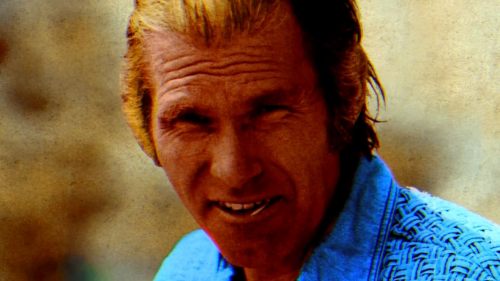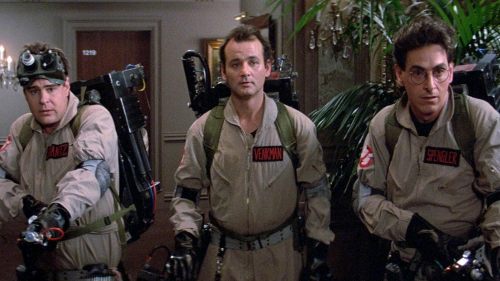Collins’ Crypt: Giving ALIEN: RESURRECTION Another Shot
As I've said before, I don't usually like to marathon a series; as much as I love the Friday the 13ths, watching Jason hack up a new batch of teens every 90 minutes isn't how I'd normally want to spend a long night or even spread out over a week - watching one or two entries a year is plenty. But for the Alien franchise, I find it easier to "binge" them because they're all so different - the series has ups and downs, of course (well, until Prometheus it's more of a steady decline in my opinion), and so every now and then when I get the urge to watch the original I follow it up with the sequels within a few days. Or, specifically, the first two sequels: every time this happens (probably four times over the past twenty years) I take Alien 3 out of the player, consider the Resurrection disc briefly, and then opt to move on from the Alien series again instead.
Now, I'm not saying I never saw it - in fact, it's the first one in the series I was able to see theatrically, on opening night no less, and I was very excited. But 17 year old me walked out disappointed, and I didn't give it another chance until the "Legacy" DVD set came out in 1999, where I discovered my opinion didn't change. Like any good fan, I upgraded to the "Quadrilogy" release in 2003 and then the "Anthology" set in 2010, but the Resurrection discs remained in their slots - I just never felt the need to bother with a revisit, even with a longer cut to entice me (I prefer the longer cuts of Aliens and Alien 3, for the record). To me it was like the AvP movies: fine to watch once out of curiosity, but no different than spinoffs, closer to fanfic or non-canon material than the core franchise. Life's too short to re-suffer Ellen Ripley rolling around on a giant alien; far as I'm concerned, she died at the end of 3 and that was the end of her story.
But over the weekend I went to a repertory screening of Amélie, a wonderful and charming movie that never fails to make me smile and laugh (the "Nino is late. Amelie can only see two explanations..." sequence is award-worthy on its own), and it was during my viewing that I realized that I had never revisited Resurrection after becoming more familiar with its director: Jean-Pierre Jeunet. I caught City of Lost Children and Delicatessen in college, Amélie whenever it came to video in the US, then saw (the underrated!) A Very Long Engagement in 2004 when it hit theaters - all of this happened after the last time I watched his Alien entry. So I figured I'd give it its long overdue second shot, and watch it not as "Alien 4" but a film from an idiosyncratic director whom I had come to admire.

And wouldn't you know it, I still don't love it. My memory, which is that it starts off OK but nosedives, was fairly accurate - the only difference is I found myself enjoying that "OK" part more than I had in the past, which I can credit to Jeunet's sensibilities that I am now more accustomed to. Until Ridley Scott came back with Prometheus, no director had ever returned to the series, and that's what kept it interesting - there was no "generic" Alien movie, per se, the way you'd expect from a series that had run that long (Prometheus was technically the 7th entry). Everyone was bringing their own ideas and interests to the table so that they weren't copying Ridley Scott's original, with Sigourney Weaver's Ripley (and the creature itself) being the only consistent element of note.
Long story short, I think your enjoyment of this or that sequel will largely depend on what you think of the filmmaker's output as a whole, and until now, I wasn't sure what this Jeunet dude was all about. I didn't see Aliens in its entirety until I had anointed Cameron a god thanks to the first two Terminators and The Abyss, and while I always enjoyed Alien 3 because it felt more like the first one (my favorite), I think every time Fincher makes another well-regarded movie, that entry finds a few more appreciators than it was afforded in 1992. Having a better idea of what the filmmaker's output is like as a whole can recolor your impressions when he/she joins someone else's party, as you can bring your expectations of their output along with whatever you want out of a sequel. So now I was more prepared for the weird humor touches (Ron Perlman shooting an ordinary spider sticks out at a moment I rolled my eyes at in theaters but now found amusing) and his off-kilter, Gilliam-esque designs and actors - there's something kind of charming about a big budget Hollywood movie where Brad Dourif is only *one* of the weirdos in it.
Plus, it genuinely works as a solid new Alien entry, at least for its first two acts. In this era of retcons and reboots, I was kind of charmed to see them not only get around Alien 3's fairly definitive ending as opposed to simply waving it away and picking up from an earlier point (i.e. the end of Aliens, which was the plan for Neill Blomkamp's thankfully aborted sequel), but do so while retaining some other continuity, such as Ripley's ongoing trouble dealing with the loss of Newt. Most of this stuff was excised for the theatrical version, but in the special edition cut (Jeunet stresses his cut was the theatrical, for the record) we see her react with sadness to a picture of a little girl, and later admit to Call (Winona Ryder) that she can't remember Newt's name. In fact the original incarnation of the story focused on a cloned Newt, assuming Sigourney would have no interest in returning to the series, but after a "dumptruck full of money" (her own words) changed her mind, Joss Whedon modified his script to focus on a cloned Ripley instead.
It also found a way to balance the scarier elements of the first and third films with the more action-oriented Aliens. In fact Jeunet (and/or Whedon, who says his script is more or less intact on screen just made in a different way than he would have liked) seems to be influenced by that film more than the other two entries - our heroes have weapons and they use them against multiple Xenos, but just not as many as Ripley and the grunts faced on LV-426. Even the list of survivors seems like a nod to Cameron's film; four people survive: Ripley, a hardass, an android, and a member who needs to be carried half the time (Newt there, Jeunet regular Dominique Pinon here, as a paraplegic whose wheelchair is made from weapons parts so they could smuggle their firepower on board). But by reducing the numbers and spreading them out across the ship, Jeunet is able to use the Xenos for a few traditional monster movie scares, something Cameron was rarely interested in.

The approach actually works great until after a standout underwater sequence, after which it's like someone flicked the switch from "good" to "bad". Ripley's clone was mixed with alien DNA, so she starts becoming at one with the creatures, time is wasted with yet another boring human villain, and the new monster that is born is even goofier looking than the Engineers in Prometheus. And while its demise is well done on an FX level, it's severely disappointing to see that, once again, Ripley kills the monster by sucking it out into space (props to Fincher for being the only one in the first four films to try something different). The first 75 minutes or so bought the film a lot of goodwill, but the last 35 burn just about all of it off with its curious mix of bad decisions and deja vu (once again, part of the climax has Ripley running down corridors trying to reach a ship before it departs). It's not AVP: Requiem level bad, but it's still a shame to see something crash and burn after showing such promise.
And that's probably why I and so many others find this one to be the low point of the Ripley entries - a movie can be great for a while, but if the ending whiffs it, that's how people remember it as a whole (works in reverse too - a bad movie can have people walking out saying it's good if the ending is great. Just ask The Lone Ranger). The first two movies have fantastic finales and the third one at least had guts even if it was polarizing. This one was just goofy and puzzling, and - if you ignore the timeline discrepancy - the ending promises the xenos finally coming to earth, which we got in the form of the lesser AVP movies, which is another red mark against its legacy in a way. Sigourney, to her credit, reportedly pushed for the weirder stuff so she wasn't just rehashing the character for the sake of doing so, but the "now she's part xeno" thing just doesn't work for me, and once it takes center stage in Act 3 it's hard to remain invested in the rest of the film.
But until that point, at least, I was glad I gave it another shot, redeeming itself a bit in my eyes. And as a Jeunet fan, in hindsight it's an interesting look at what he'd do with a big budget Hollywood movie (a franchise one at that). He says he is proud of the film, and came back to talk about it for the 2003 bonus features so his experience couldn't have been too bad (unlike his franchise predecessor, who was MIA), but alas he never worked in Hollywood again - he went back to France and made Amélie (incidentally co-starring Mathieu Kassovitz, who would in turn leave Hollywood for good after directing Babylon AD, also a FOX production) which is and may always be his biggest success, so I guess it all worked out. I have yet to see his last two movies, but revisiting this and Amélie in quick succession has given me some more drive to do so, so I will start tracking those down. And with all due respect to Ridley Scott, I hope if the Alien franchise continues that it can once again be a place where unique and offbeat filmmakers like Jeunet (and Fincher, for that manner) can be given a chance to put their own stamp on this one of a kind series. However they turn out, at least we'll never quite know what to expect.



